When choosing a web hosting provider, security should be a top priority, especially given the increasing number of online threats. This review compares the security protocols of leading UK providers such as SiteGround, Bluehost, and Hostinger, highlighting their unique features and how they protect your website. By understanding these protocols, users can make informed decisions that balance both security and performance.
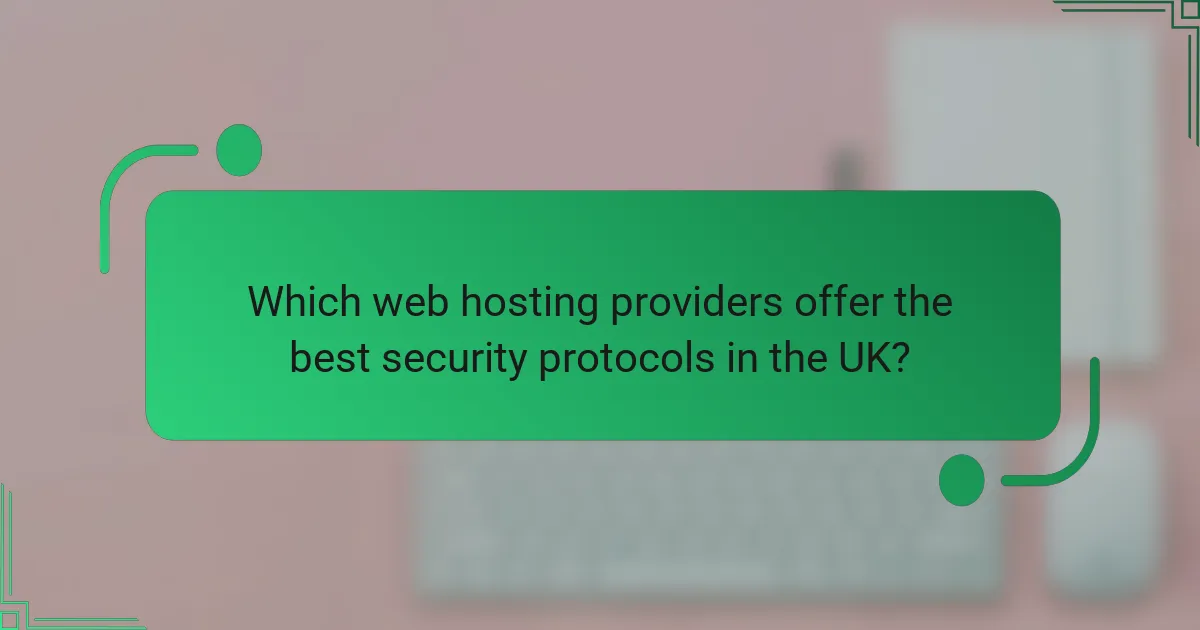
Which web hosting providers offer the best security protocols in the UK?
In the UK, several web hosting providers stand out for their robust security protocols. SiteGround, Bluehost, Hostinger, UK2.net, and Fasthosts each offer unique features designed to protect websites from various threats.
SiteGround security features
SiteGround is renowned for its proactive security measures, including daily backups and automatic updates. Their servers are equipped with AI-driven anti-bot systems that help prevent malicious attacks.
Additionally, SiteGround offers free SSL certificates, ensuring that data transmitted between the server and users is encrypted. This is crucial for maintaining user trust and compliance with data protection regulations.
Bluehost security measures
Bluehost provides a comprehensive suite of security features, including a free SSL certificate and a dedicated IP option. Their security protocols also include SiteLock, which scans for malware and vulnerabilities regularly.
Moreover, Bluehost employs advanced firewall protection and offers a spam protection feature to safeguard email accounts associated with your hosting plan. This layered approach enhances overall website security.
Hostinger security protocols
Hostinger focuses on affordability without compromising security. They provide free SSL certificates and regular backups, ensuring that your data is safe and recoverable in case of an incident.
Hostinger also implements a custom-built security system that includes DDoS protection and a firewall to block malicious traffic. Their commitment to security is evident in their proactive monitoring practices.
UK2.net security offerings
UK2.net offers a range of security features tailored for UK businesses, including free SSL certificates and daily backups. Their hosting plans come with a built-in firewall and anti-virus protection to shield websites from common threats.
Additionally, UK2.net provides a security monitoring service that alerts users to potential vulnerabilities, allowing for quick remediation. This proactive approach helps maintain a secure hosting environment.
Fasthosts security options
Fasthosts prioritises security with features such as free SSL certificates and a robust backup system. Their hosting packages include a web application firewall that protects against SQL injection and cross-site scripting attacks.
Furthermore, Fasthosts offers a security suite that includes malware scanning and removal services, ensuring that websites remain safe from emerging threats. Their commitment to security is a key selling point for many users.
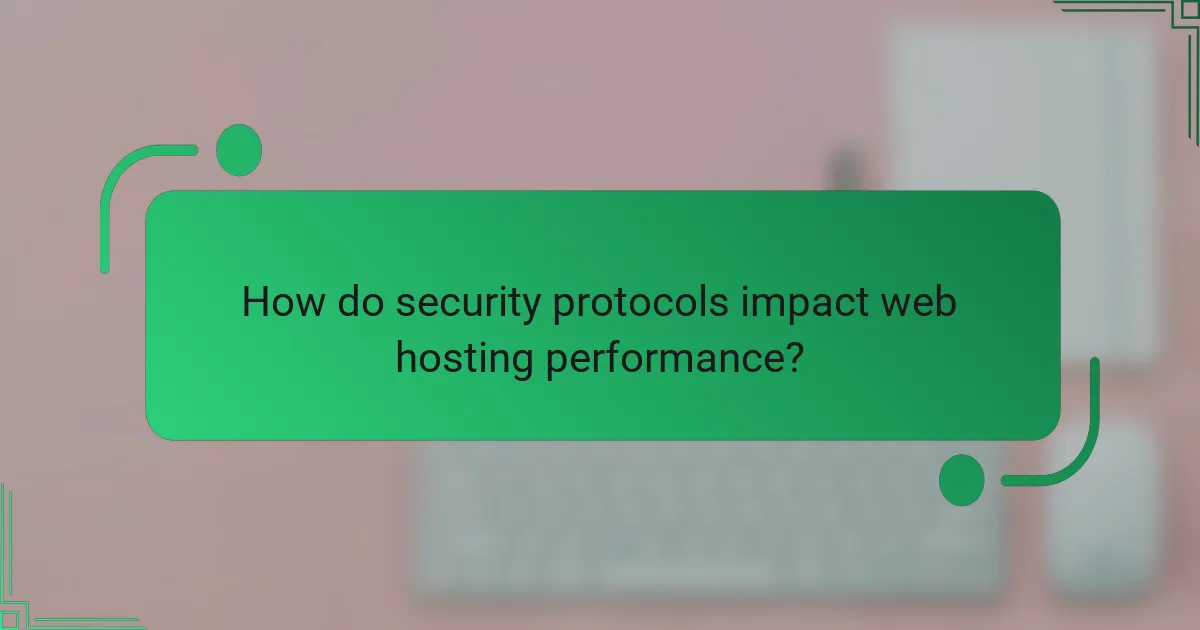
How do security protocols impact web hosting performance?
Security protocols significantly affect web hosting performance by ensuring data integrity and availability while potentially introducing latency. Understanding how these protocols operate can help users choose the right hosting provider that balances security and speed.
Impact of SSL certificates
SSL certificates encrypt data transmitted between a user’s browser and the web server, enhancing security. While this encryption process can introduce a slight delay, the overall impact on performance is often minimal, especially with modern servers that support HTTP/2, which optimises loading times.
Choosing a hosting provider that offers free SSL certificates, such as Let’s Encrypt, can save costs while maintaining security. Regularly updating and renewing SSL certificates is crucial to avoid security lapses and potential downtimes.
Role of firewalls in performance
Firewalls serve as a barrier between trusted internal networks and untrusted external networks, filtering incoming and outgoing traffic. While they are essential for protecting against threats, improperly configured firewalls can lead to increased latency and slow down website performance.
To ensure optimal performance, select a hosting provider that employs advanced firewall solutions, such as Web Application Firewalls (WAFs), which can mitigate threats without significantly affecting speed. Regularly reviewing firewall rules can help maintain a balance between security and performance.
Effect of DDoS protection
DDoS protection helps safeguard websites from distributed denial-of-service attacks, which can overwhelm servers and cause outages. Implementing effective DDoS protection can lead to slight performance trade-offs, but it is essential for maintaining uptime during an attack.
Providers often offer varying levels of DDoS protection, from basic to advanced solutions. When selecting a hosting provider, consider their DDoS mitigation strategies and ensure they can handle traffic spikes without compromising site performance. Regular testing of DDoS protection measures can help identify potential vulnerabilities.
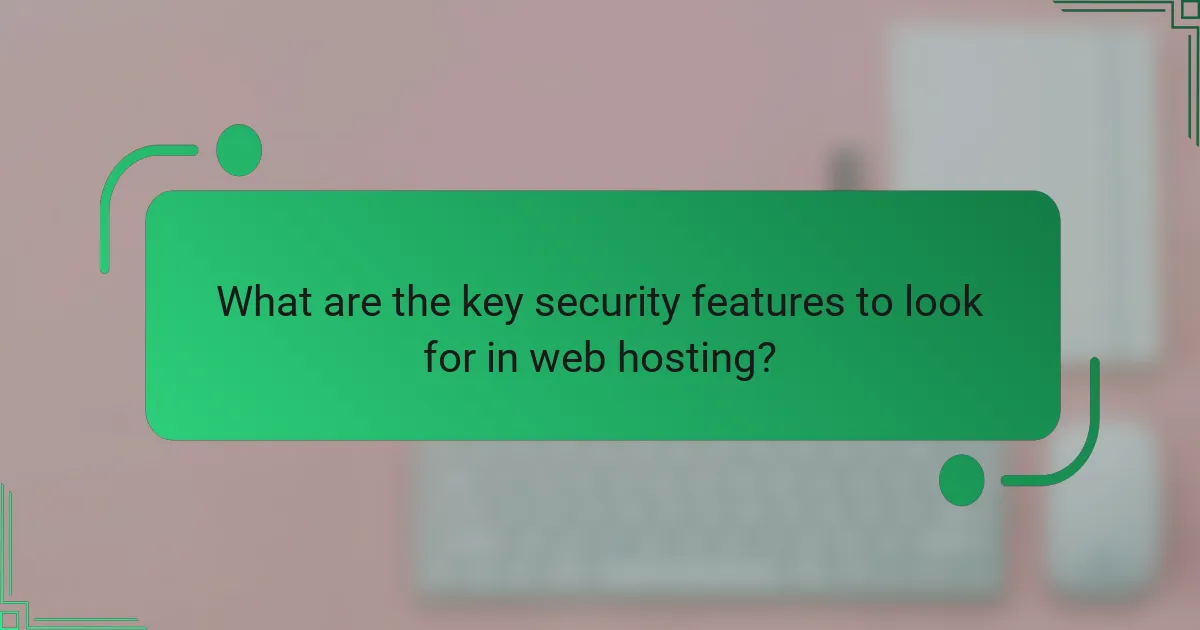
What are the key security features to look for in web hosting?
When selecting a web hosting provider, it’s crucial to consider security features that protect your website and data. Key aspects include regular backups, two-factor authentication, and malware scanning and removal, all of which help mitigate risks and enhance overall security.
Importance of regular backups
Regular backups are essential for safeguarding your website’s data against loss due to cyberattacks, hardware failures, or accidental deletions. A good hosting provider should offer automated backups at least daily, allowing for quick restoration of your site when needed.
Consider providers that store backups in multiple locations to ensure redundancy. This way, even if one backup fails, you can retrieve your data from another source. Always verify the backup process and test restorations periodically to ensure reliability.
Two-factor authentication benefits
Two-factor authentication (2FA) adds an extra layer of security by requiring not only a password but also a second form of verification, such as a text message or authentication app code. This significantly reduces the risk of unauthorised access to your hosting account.
Implementing 2FA is a straightforward process and can often be enabled through your hosting provider’s control panel. Ensure that your chosen provider supports 2FA and encourage all users with access to the account to activate it for enhanced security.
Malware scanning and removal
Malware scanning and removal services are vital for identifying and eliminating malicious software that can compromise your website’s integrity. A reliable hosting provider should offer continuous scanning to detect vulnerabilities and threats in real-time.
Look for hosts that provide automatic malware removal features, as this can save you time and effort in managing security threats. Additionally, consider those that offer a clean-up service if your site is compromised, ensuring a swift recovery without significant downtime.
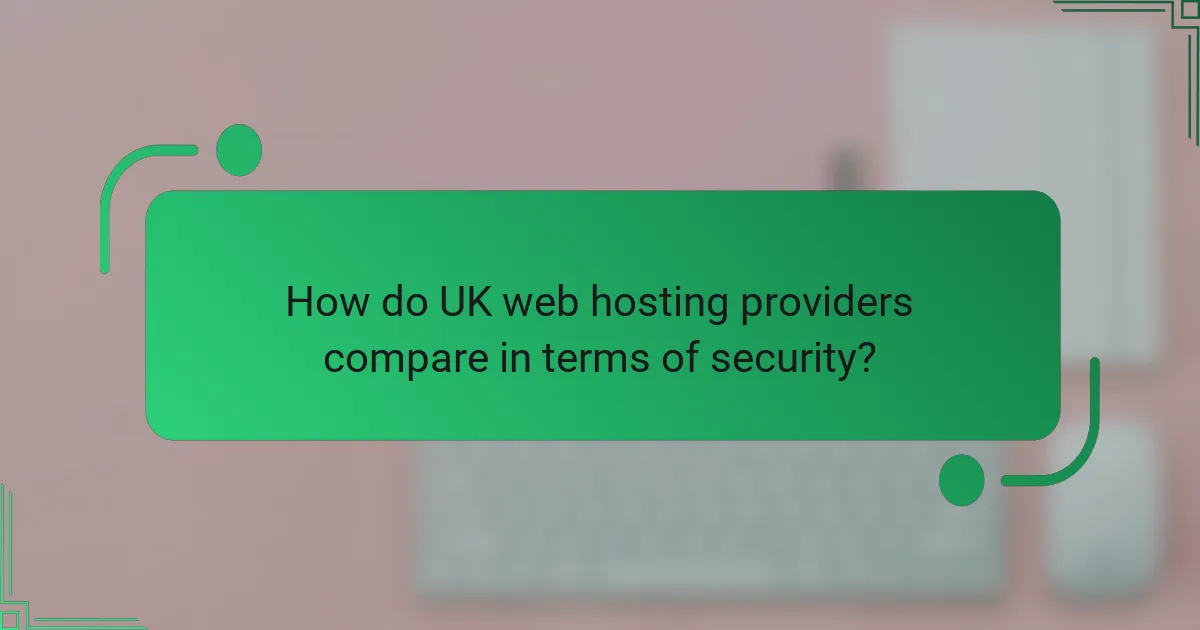
How do UK web hosting providers compare in terms of security?
UK web hosting providers vary significantly in their security measures, which can impact the safety of hosted websites. Key factors include the implementation of firewalls, data encryption, and regular security audits.
Comparison of security ratings
Security ratings for UK web hosting providers are often derived from independent assessments and customer feedback. Providers may be rated on a scale from low to high based on their security features, such as DDoS protection, SSL certificates, and backup solutions.
For example, some hosting companies may receive high ratings for robust security protocols, while others may fall short due to inadequate measures. It’s advisable to look for providers with consistently high ratings from reputable sources.
Customer reviews on security
Customer reviews can provide valuable insights into the security performance of web hosting providers. Many users share their experiences regarding security incidents, response times, and the effectiveness of support teams in addressing security issues.
When evaluating customer feedback, pay attention to recurring themes, such as the promptness of security updates and the overall reliability of the hosting service. This can help you gauge how well a provider manages security threats.
Industry certifications and compliance
Industry certifications and compliance with standards such as ISO 27001 or GDPR are crucial indicators of a web hosting provider’s commitment to security. These certifications demonstrate that a provider adheres to recognised security practices and is accountable for data protection.
Choosing a provider with relevant certifications can enhance your confidence in their security measures. Always verify the certifications listed on their website and ensure they are up to date, as this reflects their ongoing commitment to maintaining high security standards.
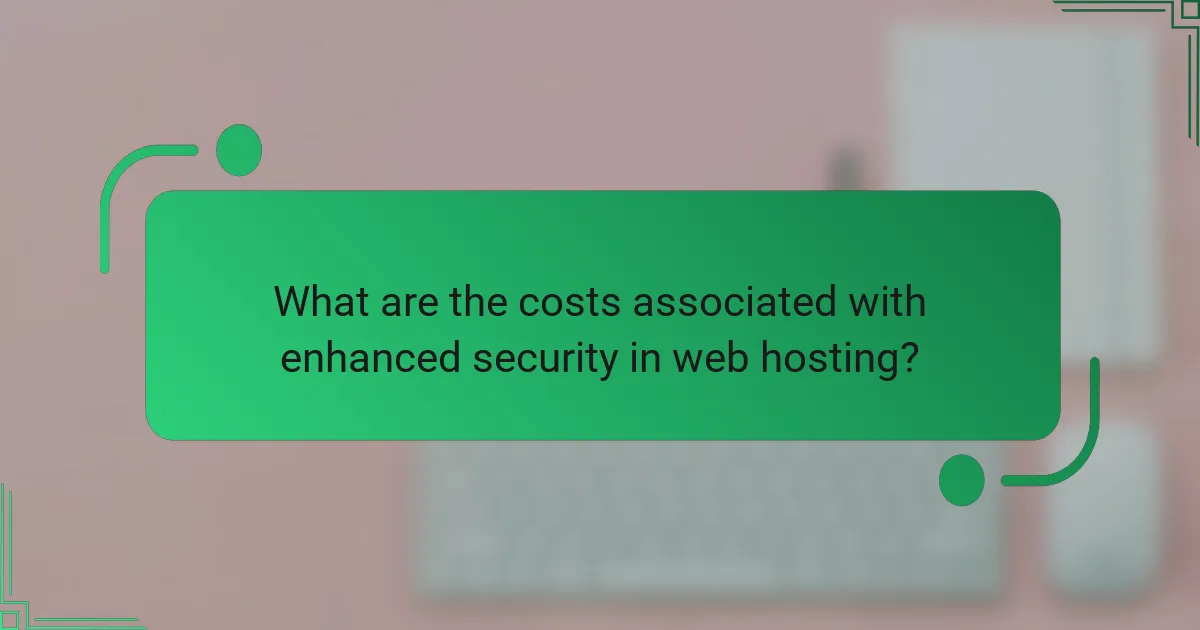
What are the costs associated with enhanced security in web hosting?
Enhanced security in web hosting typically involves various costs, including fees for SSL certificates, additional security features, and managed security services. These costs can vary significantly based on the provider and the level of security required.
Pricing for SSL certificates
SSL certificates are essential for securing data transmitted between a website and its users. Prices for SSL certificates can range from around £10 to several hundred pounds per year, depending on the type and level of validation. Basic Domain Validation (DV) certificates are usually the least expensive, while Extended Validation (EV) certificates, which provide higher trust levels, tend to be more costly.
When selecting an SSL certificate, consider the specific needs of your website. For e-commerce sites, investing in a higher-level certificate may be worthwhile to build customer trust and ensure secure transactions.
Costs of additional security features
Many web hosting providers offer additional security features, such as firewalls, malware scanning, and DDoS protection. The costs for these features can vary widely, typically ranging from £5 to £50 per month, depending on the level of protection and the provider’s offerings. Some providers may include basic security features in their hosting packages, while others charge separately.
When evaluating these costs, assess the potential risks your website may face. Investing in robust security features can save you from costly data breaches and downtime in the long run.
Value of managed security services
Managed security services provide comprehensive protection for your website, including monitoring, threat detection, and incident response. The costs for these services can range from £30 to over £200 per month, depending on the level of service and the size of your website. While these services may seem expensive, they can significantly reduce the risk of security incidents.
Consider whether your team has the expertise to manage security in-house. If not, opting for managed services can be a valuable investment, ensuring that your website remains secure and compliant with industry standards.
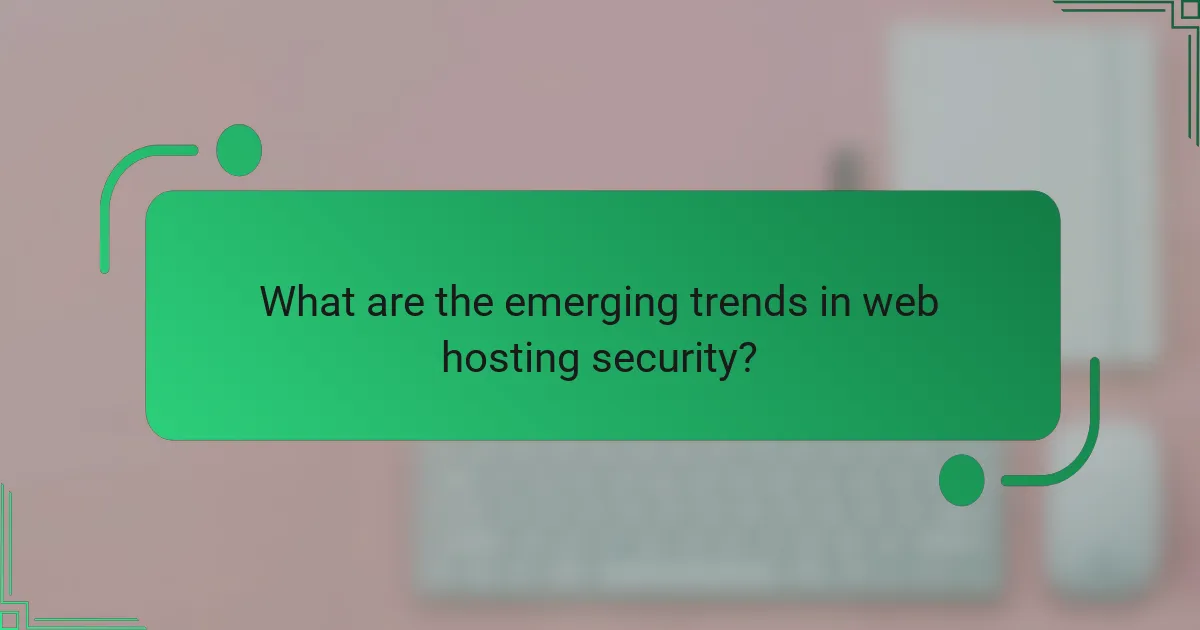
What are the emerging trends in web hosting security?
Emerging trends in web hosting security focus on advanced technologies and practices to combat evolving threats. Key developments include the integration of artificial intelligence, enhanced encryption methods, and a greater emphasis on compliance with data protection regulations.
Adoption of AI in threat detection
The adoption of artificial intelligence (AI) in threat detection significantly enhances web hosting security by automating the identification of potential vulnerabilities and attacks. AI systems can analyse vast amounts of data in real-time, allowing for quicker responses to threats compared to traditional methods.
Web hosting providers are increasingly implementing AI-driven tools that use machine learning algorithms to recognise patterns associated with malicious activities. This proactive approach helps in mitigating risks before they escalate into serious breaches.
When selecting a web hosting provider, consider those that utilise AI for security. Look for features such as automated threat detection, anomaly detection, and predictive analytics, which can provide an added layer of protection for your website.